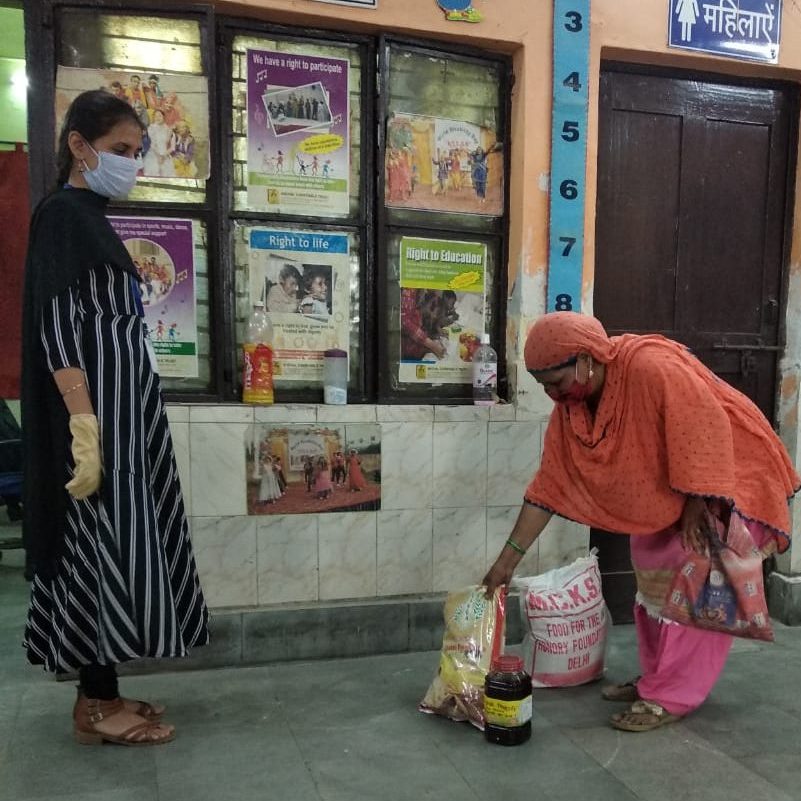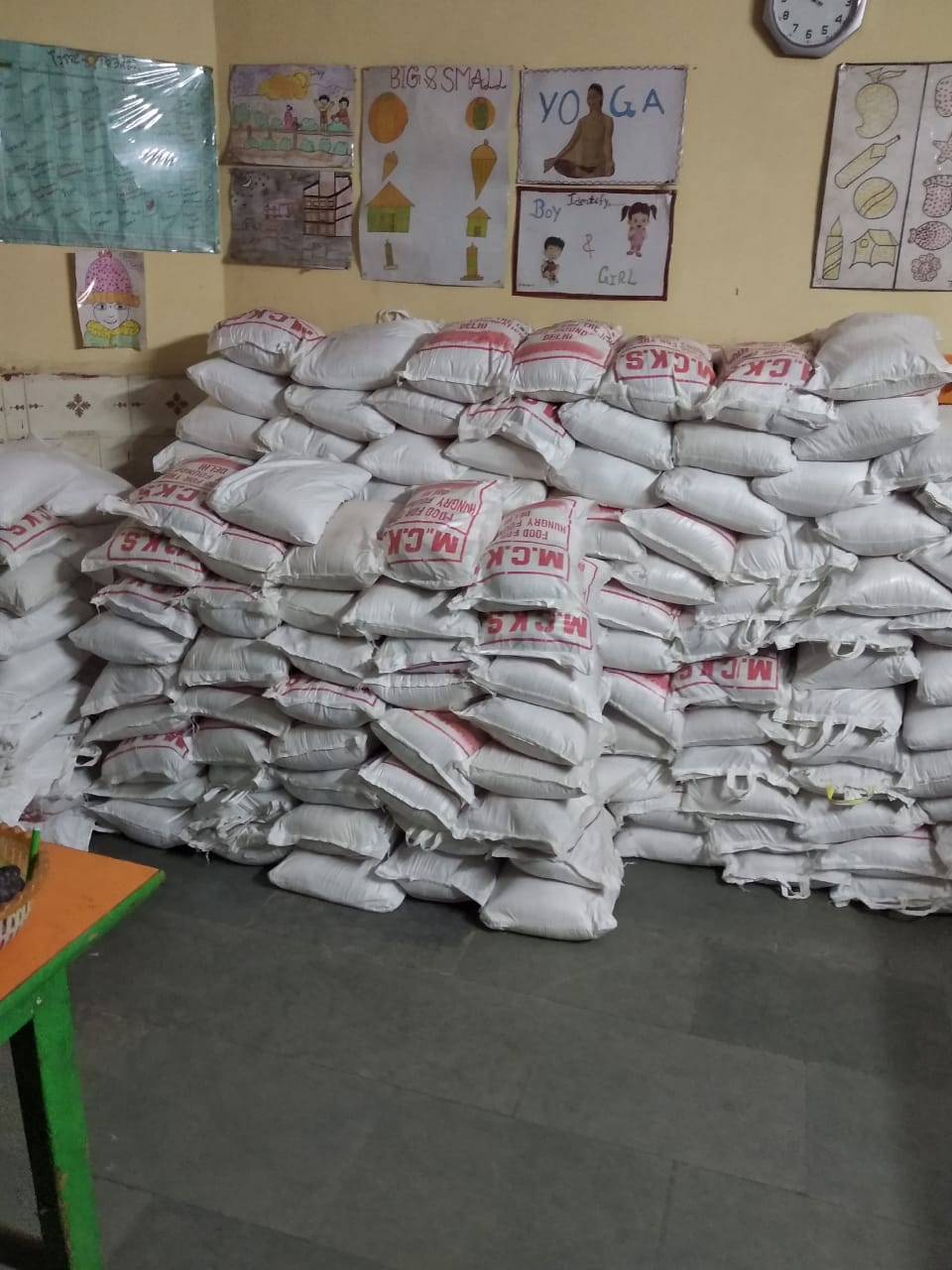Women in Sex Work – The community at the heart of Alliance India’s COVID-19 Response

Ration being distributed to the community member
The term “marginalized” refers to a person, group, or concept treated as insignificant or peripheral. What is typically marginalized groups like women in sex work, LGBTQ groups, people living with HIV/AIDS and people who use drugs don’t have easy access to any health or welfare measures and that’s what makes them most vulnerable and consequently at greater risk with limited or zero access to lifesaving drugs, food, nutrition and related other supportive interventions.
Women in sex work is one such group that Alliance India has prioritized for the COVID-19 response. This in turn is ensuring that the momentum to HIV 90:90:90 targets is also not lost as a result of the challenges due to the lockdown. Thanks to the generous support from Mac AIDS Funds and Tides Foundation, Alliance India’s Ujwala project continues to serve Women in sex work in two Indian cities i.e., Delhi and Warangal. The overall strategy of Ujwala project involves reaching to most vulnerable women in sex work unreached in virtual spaces in Delhi with the help of Aanchal Trust and in Andhra Pradesh (Warangal district) reaching to the traditional women in sex work who are subject to constant migration due to their profession. In the last two years (2018-2020), the project has reached 4,560 community members and encouraged almost 90% of these high-risk women for HIV testing in government health facilities. The project also provides crucial health support on sexual reproductive health needs and addresses gender-based violence which acts as a structural barrier among women in sex work to access health need services. Women in sex work are more vulnerable during the COVID-19 situation due to lack of business, low savings, larger responsibility, and dependence of family members with poor socio-economical living standards.

Dry ration stock for distribution
Two weeks back, Alliance India was approached by Ujwala project partner; Aanchal Trust (working in Delhi with 1500 women in sex work) with a request to support 250 women in sex work with dry food rations. Most of these women are very marginalized – socially and economically – and operate through virtual sex networks. This adds to the challenge of ensuring their confidentiality and at the same time provide them and their families the required support. Kunal Kishore, Associate Director for Alliance India’s Harm Reduction Programme was approached for support. Along with charities and faith-based organizations, he has been involved in mobilizing emergency support for the marginalized communities during the ongoing COVID-19 lockdown. Along with the Gender & Sexuality Team of Alliance India, United Religious Initiative, Centre for Advocacy & Research & MCKS Food for Hungry Foundation, the requested support was mobilized and made available within a week.
More than 277 families of women involved in sex work were eventually provided ration, nutritional items, and sanitary napkins which are expected to be enough for 3 weeks.
During the ration distribution, the community members were also sensitized by Ujwala outreach workers on social distancing, prevention methods for COVID-19, and access to health services such as Antiretroviral (ARV).
Alliance India’s work is not done yet and we will continue to respond to the community needs as they come irrespective of where they may be. We stand in solidarity with our communities and commit ourselves to ensure all HIV services including preventing Gender-Based Violence to those who need the most. Together, we can fight Corona and ensure the mission of Alliance India – ‘To strengthen community action for equitable and healthy societies’.
Other Recent Articles
- Yoga for Wellness: Supporting People Living with HIV & NCDs 25 June, 2025
- The Unsung Heroes of HIV Care: Outreach Workers under the Vihaan Programme 8 May, 2025
- Men’s Mental Health Matters in HIV Care 1 April, 2025
- Transforming Lives through Health Interventions: My Visit to Narmadapuram Prison 11 July, 2024
- HIV and Ageing: Understanding the Unique Needs of Older Adults 20 May, 2024
- Youth Voices: Life with HIV in Contemporary India 26 September, 2023
- Empowering Transgender Community to create an Equal World 20 July, 2023
- Combating Stigma and Discrimination Among People Living with HIV 7 July, 2023
- Understanding the Significance of HIV Testing: Impact on Individuals, Relationships, and Society 22 June, 2023
- Empowering Lives during Unrest l Our Commitment to Manipur 5 June, 2023
- Made by Nicdark - Copyright 2020
- donations@ong.com
- volunteers@ong.com
- contact@ong.com
India HIV/AIDS Alliance (Alliance India)
A not-for-profit Section 8 Company with Registration No: U85310DL1999NPL098570
Contact
-
6, Community Centre
Zamrudpur Kailash Colony Extension
New Delhi – 110048 - +91-11-4536-7700
Download
©2021 All Rights Reserved by Alliance India



